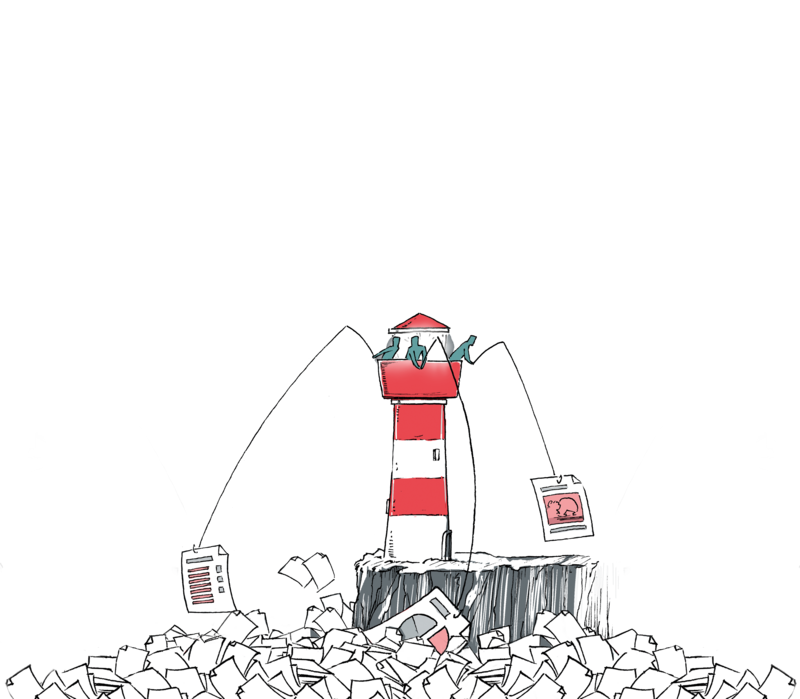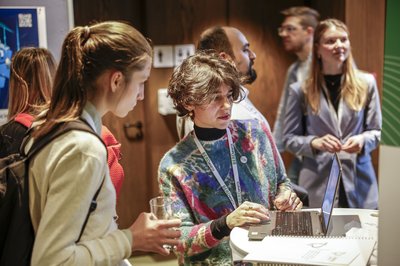
2024 was a year of exciting developments for TIB. One particular highlight was the launch of our new “ORKG Ask” service. This innovative search and exploration system uses artificial intelligence (AI) to answer scientific questions and also helps researchers find the scientific contributions they are really looking for. The AI tool is an important step towards making research results more transparent and comparable and scholarly knowledge more accessible.
By signing the Barcelona Declaration, we at TIB have reaffirmed our commitment to the principles of open and sustainable science and emphasised that we actively support the shift in research towards open research information.
In May we celebrated the reopening of the newly refurbished Patents and Standards Reading Room. The result is a modern place for learning and meeting. But the historic reading room in the Marstall building is not only a place for concentrated work, it also offers space for events.
For us at TIB, the exchange with society and the scientific community plays an important role – whether on site at conferences, workshops or formats such as the Technik-Salon or at our purely virtual conference #vBIB.
We would like to thank all our staff and partners for their valuable contributions and commitment. We look forward to continuing to work together towards the vision of open and accessible science in the coming year.
Yours,
Sören Auer / TIB Director
Electronic journals, also known as e-journals, have become commonplace and indispensable in many scientific disciplines. In the case of open access e-journals, the content is even freely available online to all researchers and interested readers. It is therefore important that these journals be available in perpetuity, even if publishers go out of business or their proprietary platforms are discontinued.
Digital preservation at TIB enables electronic data to be used and read for many years to come: its task is to identify and understand the characteristics of the various digital formats and to develop strategies for their survival.
As one of 18 Keepers worldwide and the second in Germany to cooperate with the ISSN International Centre, TIB lists its e-journals in the Keepers Registry. This platform enables libraries, repositories and archives to check the archiving status of journals.
TIB’s digital collection currently includes around 2,500 journal titles, including Wiley journals, for which TIB has taken on the national role of Dark Archiving for the DEAL Consortium.
The TIB AV-Portal, the video portal of TIB, is celebrating its 10th anniversary this month. This is a great opportunity for us to talk to Margret Plank and Matti Stöhr about the portal. As head of the Lab Non-Textual Materials, Margret Plank has been responsible for the TIB AV-Portal from the very beginning, while Matti Stöhr has been supporting it as Community Manager since May 2020.
Margret Plank: When we started working on the topic of scientific film in 2010, our aim was to make scientific videos more accessible and usable. At that time, it was already clear that the TIB would take over the holdings of the former IWF Wissen und Medien gGmbH, i.e. holdings from 100 years of scientific film. In addition, the production of scientific videos in various formats was increasing rapidly, and even NASA launched a YouTube channel at the time.
The development of our portal focussed on user-friendliness and used expert interviews and environment analyses in the early stages. Our vision was a video portal that indexes the spoken language, text and image information in addition to the metadata: This would make videos just as searchable as a full text. Each video was to receive a DOI (Digital Object Identifier) and be citable to the second.
While analysing the environment, we came across a project by the Hasso Plattner Institute, which was working on a video portal for film archives together with the companies FlowWorks and Filmwerte. We then joined forces and created a prototype, which we tested with the company Usability.de at CEBIT 2013. The final product – the TIB AV-Portal – was launched in April 2014 with 2,000 videos.
Matti Stöhr: In the years that followed, the TIB AV-Portal developed on many different levels in what can – spoiler alert – be seen as a success story. It was clear from the outset that the platform would not be limited to storing and (innovatively) making available the IWF‘s historical film heritage, which is still being intensively processed and edited today. Current scientific films in a wide range of genres – from conference recordings and educational films to video abstracts – have been and continue to be actively and successfully acquired in a targeted and sometimes campaign-like manner.
This was and is not trivial, because our credo is the binding, long-term clarification of copyright and personal rights. And, if possible, in the form of open Creative Commons licencing. Increasingly, more and more scientific institutions and individual researchers approached us with their videos, also and especially through intensive public relations and community work. By mid-2017, 10,000 videos were already available on the portal, and two years later 20,000. Since the end of 2022, well over 40,000 videos have not only been searchable and viewable, but most of them can also be reused extensively and flexibly thanks to open data.
Open research information – this is the call from the original signatories of the “Barcelona Declaration on Open Research Information”, including TIB. The organisations are committed to changing the way research information is used and accessed. Research information is the metadata associated with the research activities of scholars, institutions and projects, with conferences, research data and software, scientific monographs and journal articles.
The Declaration highlights the value of openly accessible research information for the scientific community and for the transparent and fair evaluation of its actors. Too often, decision making in science is based on closed research information. Information is locked inside proprietary infrastructures run by for-profit providers that often impose severe restrictions on the use and reuse of the information. There is a lack of transparency and reproducibility. Errors, gaps and biases in closed research information are difficult to expose and even more difficult to fix. Decisions about the careers of researchers, about the future of research organisations, and ultimately about the way science serves the whole of humanity, depend on this research information.
In April 2024, more than 40 scientific organisations committed to making open research information the norm as the first signatories of the “Barcelona Declaration on Open Research Information”. Since then, many have followed their example: By the beginning of December 2024, 144 organisations from 26 countries had signed or endorsed the declaration. Open research information enables science policy decisions to be made based on transparent evidence and inclusive data. It enables information used in research evaluations to be accessible and auditable by those being assessed. And it enables the global movement towards open science to be supported by information that is fully open and transparent.
Digital teaching and learning materials are essential to modern higher education teaching. It is therefore important that they are openly licensed, freely accessible and usable as Open Educational Resources (OER). This is the case with twillo, the OER portal funded by the Ministry of Science and Culture of Lower Saxony, and the Open Resources Campus NRW, funded by the North Rhine-Westphalia Ministry of Culture and Science. Since 2024, there has been a forward-looking collaboration between these two actors: the OER portal twillo provides the repository – a document server – for ORCA.nrw.
Until now, many federal states have developed the technical infrastructure of their portals for digital teaching and learning materials independently of each other. Now, for the first time, two state portals are collaborating to create synergies in the operation of repositories (document servers) – a core component of the technical infrastructure. Thanks to this collaboration, users from North Rhine-Westphalia and Lower Saxony can access the same repositories to share OER.
“This cooperation is an important contribution to the development of digital university teaching. We are delighted that our Lower Saxony initiative has been well received both regionally and nationally and is helping to improve access to digital education,”, remarked Professor Joachim Schachtner, State Secretary at the Ministry of Science and Culture of Lower Saxony.
The International Day for Universal Access to Information (IDUAI) is celebrated every year on 28 September. This day, established by UNESCO, aims to draw attention to the importance of free and unrestricted access to knowledge as a human right and the basis for sustainable development and innovation.
As the German National Library of Science and Technology as well as Architecture, Chemistry, Computer Science, Mathematics and Physics, TIB not only holds a unique collection of scientific information on science and technology, but has also been committed to open access to information and research results for many years. By providing services in the areas of open access, research data management and innovative digital services, TIB makes a significant contribution to ensuring that researchers and the interested public have access to important scientific resources.
TIB provides researchers and other interested parties with a variety of services that enable them to access valuable information worldwide: For example, the TIB AV-Portal provides access to scientific videos, the twillo portal makes Open Educational Resources available, and with its own Open Access publisher, TIB Open Publishing, TIB provides the appropriate infrastructure for Open Access publications. In addition, TIB is driving the open access transformation by negotiating attractive licence agreements and providing financial support for preprint platforms such as arXiv and chemRxiv.
The ORKG Ask service, a scientific search and exploration system, helps researchers to efficiently answer research questions based on 80 million scientific publications and with the help of artificial intelligence. By analysing and comparing research results, ORKG Ask not only gives users structured, relevant information, but also facilitates interdisciplinary research and knowledge transfer.
Lower Saxony’s Science Minister Falko Mohrs visited TIB in August. In a series of conversations and during a tour of the library – including the Computer Centre – the Minister gained an insight into TIB’s activities and current projects.
Falko Mohrs, Lower Saxony’s Minister of Science and Culture
Whether at the Sixth Retro Digitisation Workshop, the NFDI4Energy Conference, the Second International Conference on FAIR Digital Objects, the Open Science Community Hannover Meetups or the purely virtual formats ScienceVideoCamp and #vBIB24 – the aim of these and other conferences and workshops organised by TIB is to promote networking and exchange with specialist communities.
